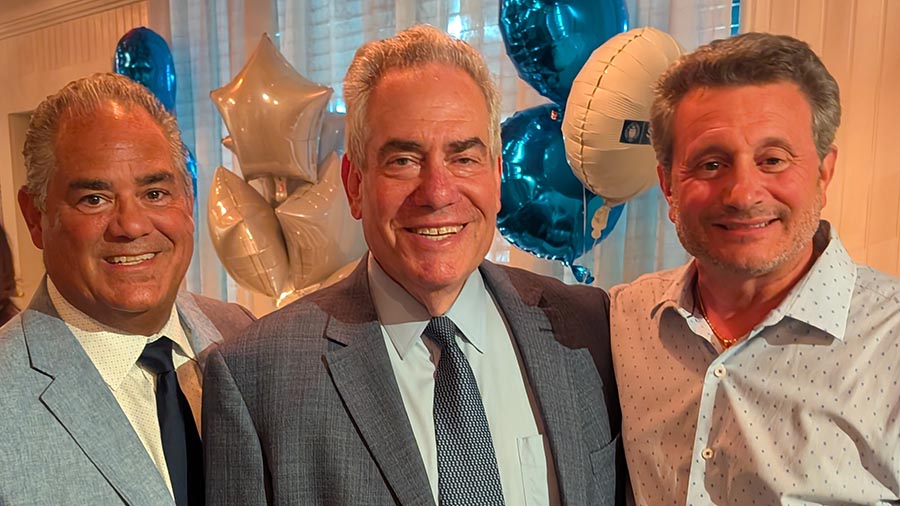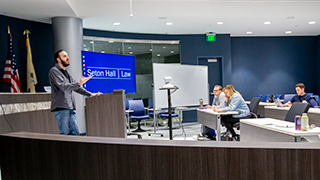Seton Hall University Law School held its Fourth Annual Sports Law Symposium on Wednesday, November 8, 2023, centered around the theme “Money in Sports,” and the evolving landscape of investment in sports betting, sports media, and teams and leagues. The event featured a diverse array of panels with 18 experts, including investment bankers, season professionals from professional leagues, and prominent attorneys working in the sports space.
Guided by student Co-Presidents of the Seton Hall Law School Entertainment & Sports Law Society (ESLS), Amber Osterbrink and Emily Nesi, and their cabinet, the symposium coincides with several exciting initiatives underway at Newark, New Jersey-based Seton Hall Law School related to Sports Law and the adjacent spaces of Gaming, Hospitality, and Entertainment Law.
Commencing with an ethics panel featuring five sports law professors from New York and New Jersey law schools, the discussion delved into the concept of “sport washing,” shedding light on how state actors integrate into global sports to influence perceptions of repressive regimes. The panel also tackled ethical challenges associated with legalized sports betting and the conflicting messages associated with advertising such businesses.
Each panel seamlessly transitioned to the next, with the second panel exploring a noteworthy year of investment in sports betting. Panelists included equity fund leader Chad Stender of SeventySix Capital, casino and resort investment banker Matt Sodl of Innovation Capital, Seton Hall Law alum Megan Kelleher ‘21 of Fanatics Licensing & Betting, attorney Adam Berger of the firm Duane Morris and moderator Deputy Attorney General Michael Golub of New Jersey’s Division of Gaming Enforcement. The conversation ultimately turned to Penn Entertainment’s significant deal with ESPN, marking the sports media giant’s most serious foray into sports betting.
The following panel cued by the Penn-ESPN deal took on the sports media climate, which was described as “interesting,” by SeventySix Capital’s Sports Advisors President Dan Bravato. Pivoting off Bravato’s comment, panelists, including Seton Hall Law alum Tracy Deforge ‘99 of The Players Impact, award-winning sports journalist Jane McManus, Executive Director of Seton Hall’s Center for Sports Media, and entertainment lawyer turned producer Mike Sword of Broadcasting Diplomacy, detailed a time of disruption in sports media with both opportunities and challenges presented by changing audiences and consumer choices. The conversation, moderated by Investment banker Christopher Russo of Fifth Generation Sports, emphasized the value of an engaged community in an era of cord-cutting and challenging audience dynamics. The panelists agreed that significant gains having been made in women’s sports and sports-specific programming content, “with everyone looking for the next Drive to Survive.” Bravato added that in this era of chord-cutting and diminishing audiences, it may be more valuable to have “an engaged community rather than a passive audience,” as a final thought.
After nearly 5 hours of thought-provoking discussion, with a steady audience of more than 50 students, and attorneys, and with nearly all of the panelists remaining throughout the day, concluded with a discussion of investment in leagues and teams. Tracy Deforge and Chris Russo stayed on to discuss the year marked by rising investments in sports leagues and teams, joined by Sidley attorney Dylan Sherwyn, Skadden lawyer Peter Schwartz, Gibson Dunn Real Estate Practice Head Andrew Lance, and former NFL Senior Vice President Frank Hawkins. Moderated by Gibson Dunn associate Anthony Lombardo, this panel reflected on the surge in the record prices of U.S. sports franchises, from $4.65 billion when the Denver Broncos were sold in August 2022, to $6 billion in July 2023, and explored some of the reasons why the professional sports investment climate still appears to be so bullish.
In addition to the symposium, Seton Hall Law marked the launch of a pioneering J.D.-degree concentration in Gaming, Hospitality, Entertainment & Sports Law (GHamES). This unique program leverages the law school’s locational advantage of being in the NJ/NY metropolitan area to help connecting students to these developing fields. Dean Devon Corneal, who offered the day’s welcome, and Professor Robert Boland, who is a veteran sports lawyer and teacher, provided faculty oversight to the symposium and ongoing leadership in the GHamES concentration.
Furthering its commitment to interdisciplinary study, Seton Hall, as part of a group awarded the Provost’s Academy grant, initiated the Interdisciplinary Academy for the Study of Sports. This collaboration connects the strengths of the Stillman School of Business and the College of Human Development, Culture, and Media's Center for Sports Media, where former National Basketball Players’ Association Executive Director Charles Granthem leads the Center for Sports Management, and noted journalist and symposium panelist Jane McManus leads the College of Human Development, Culture and Media’s Center for Sports Media.
Professor Boland, in concluding the day, expressed gratitude to the panelists, student Co-Presidents, volunteers, and participating alumni. He highlighted Seton Hall Law School's pioneering role in sports law education and its rich history of leadership, aiming to revitalize and continue this tradition, noting that, “Seton Hall Law School is one of the first law schools to have a sports law program that includes a journal and a symposium, and that the energy around Sports, Gaming, Hospitality, and Entertainment Law at the school draws on this great history of leadership and the success of its alumni. It is my desire to give that tradition a full renaissance, now.”
For more information, please contact:







